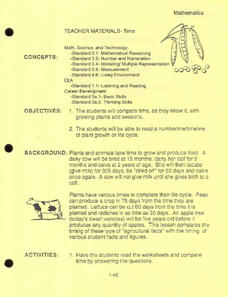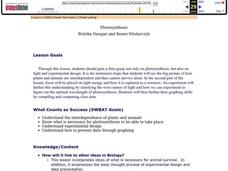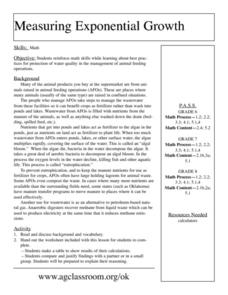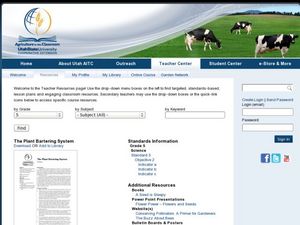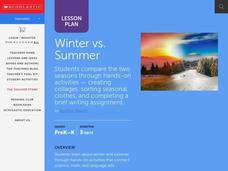Curated OER
Time
An interesting lesson focuses the growth cycles of plants and animals. Learners look at plants like radishes, peas, and apples, and compare their growth cycles to those of dairy cows. Some very good worksheets are included in this plan...
August House
Go to Sleep, Gecko
Use this multidisciplinary instructional activity to delve into these subjects: English language arts, math, science, drama, and character education. After reading, discussing, and making interpretations about Go To Sleep, Gecko!: A...
Curated OER
Exploring Biomes Lesson 3: Endangered Biomes
Future environmental scientists compare data from two different conservation strategies. Alone this lesson is sufficient, but as part of the Exploring Biomes unit produced by the Arizona Fish and Game Department, it becomes top-notch.
Curated OER
Soil Scrolls
Third graders examine soil samples and explore the what happens in each layer of the subsoil. They work in cooperative groups to create a scroll that shows what takes place in each layer, and discuss why much of the activity is in the...
Curated OER
Photosynthesis
Students recognize the importance of plants as they perform an experiment involving photosynthesis. Students determine the optimum wavelength of light for photosynthesis by exposing plants to different colors of light, collecting data,...
Curated OER
The Great Pollinators
Students discover the reproductive parts of a plant. In this biology lesson, students identify and categorize several different plants they dissect in class. Students record their information using a data chart.
Curated OER
Seed Sorting 101
Learners sort through numerous seeds to find similarities and differences. In this sorting and classifying lesson, students divide up different plant seeds based on their similarities and differences, while keeping record of their findings.
University of Colorado
Punnett Squares with Piebald Deer
Explore the science behind Earth's amazing diversity of life with this instructional activity on genetics. Looking at specific traits in piebald deer, carnations, and roan cattle, young scientists use Punnett...
Curated OER
Managing Nutrients in Livestock Manure
Livestock managers reinforce math and science skills while learning about the nutrients found in manure. They predict which animal produces the largest amount and which animal's manure contains the most nitrogen. Finally, they compare...
Curated OER
Prairie Adaptations
Twelfth graders consider the survival of prairie plants. They examine how some tallgrass prairie species are adapted to the conditions of their ecosystem. They make a prediction of how a species might change given new conditions.
Mascil Project
Water Quality
How do you prevent the spread of water-borne illness in large public swimming areas? Scholars discover the challenges to identifying safe water through an inquiry experiment. They then produce posters sharing their understanding of water...
Curated OER
Prairie In A Bottle
Second graders observe images of prairie ecosystems and discuss the needs of living things. They create a prairie habitat in a closed jar to observe the water cycle and plant growth.
Curated OER
Graze Like a Cow
Students explore how a cow digests the grass they eat. In this science/math lesson, students compare the quality of forage. Additionally, students determine the effects of rangeland health on the production.
Curated OER
Measuring Exponential Growth
Students reinforce math skills while learning about best practices
for protection of water quality in the management of animal feeding
operations. They make a table to show results of their calculations and compare and justify findings...
Curated OER
The Plant Bartering System
Fifth graders explore plant characteristics by viewing a flower and seed presentation. In this environmental adaptation activity, 5th graders identify specific traits plants have in order to allow them to grow in different climates...
Curated OER
Prey or Pray? Could YOU Escape a Cheetah?
Tenth graders estimate the size of an adult cheetah by research and measurement of a picture. They determine the approximate distance and speed of the cheetah from a filmed chase and compare that to their own running speed.
Curated OER
It Counts
Young scholars assign numbers to describe objects. In this number instructional activity, students assign numbers to objects and compare more, less, and equal values. They write down descriptions of plants including the number of leaves...
Curated OER
Winter vs. Summer
Students explore the seasons. For this winter and summer lesson, students read The Snowy Day by Ezra Jack Keats and Summer by Maria Ruis. Students compare the 2 seasons as they create t-charts, try on seasonal clothing, and create collages.
Curated OER
Plastic Wrap
Young scholars compare the price and quality of different kinds of plastic kitchen wraps and then rank them from best to worst. They take into account how well it comes out of the roll, if it seals well, it is tangles, how much weight...
Living Rainforest
Finding the Rainforests
From Brazil to Indonesia, young scientists investigate the geography and climate of the world's tropical rain forests with this collection of worksheets.
Curated OER
Harvesting and Threshing the Seed
Students harvest and thresh the seeds. They count the seeds and compare that number with the original number of seeds planted (8) to determine their profit or loss. Finally, students think about additional questions they have about...
Curated OER
Alternative Alphabet
Students determine and compare hieroglyph content and frequency to an alternative alphabet based on symbols that mimic sounds of the alphabet.
Curated OER
Alternative Alphabet
Learners determine and compare hieroglyph content and frequency to sentences constructed in an alternative alphabet based on symbols that mimic sounds of the alphabet. They decide which images are hieroglyphs and which ones are not.
Curated OER
The Mister Runtles' Bet
Students listen to a story dealing with exponential and linear growth. After reading the story, students complete a table comparing information. Using a calculator, students graph the rice and daily population of flies. They study the...
